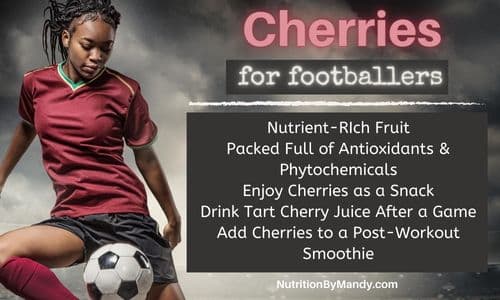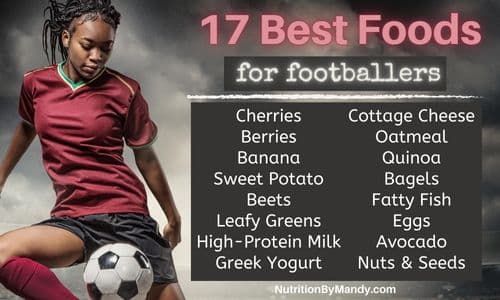Last Updated on February 26, 2025 by Mandy Tyler, M.Ed., RD, CSSD, LD
Best Food for Footballers: 17 Top Choices
It can be helpful for footballers to know what foods to include in their meal plans to support their health and performance needs.
Let’s take a look at key nutrients soccer players should include in their diets. Then we will explore 17 of the best food choices for footballers.
Food for Footballers: Key Nutrients
Footballers looking to build a healthy meal plan should focus on including a variety of foods in their diet.
Foods containing carbohydrates, lean protein, and healthy fats are all essential components of a sports nutrition diet for a competitive soccer player.
Carbohydrates for Footballers
Foods rich in carbohydrates should be at the foundation of a footballer’s meal plan. Carbohydrates provide athletes with the energy needed to perform at their best on the field.
Athletes can add carbohydrates to their diets from a variety of food groups, including:
- Fruit: Fresh, frozen, dried
- Starchy vegetables: Potatoes, sweet potatoes, corn, peas, beans, legumes
- Grains: Bread, bagels, pasta, rice, oatmeal
- Dairy: Milk and yogurt

Protein for Footballers
In addition to carbohydrates, protein is important in the diet of soccer players.
Protein has many essential roles in the body, including supporting soccer players with building and maintaining lean muscle mass.
Healthy Fats for Footballers
Finally, footballers should round out their meal plan with foods containing healthy, unsaturated fats, such as fatty fish, nuts, seeds, and avocados.
Best Food for Footballers: 17 Top Choices
Let’s now take a look at 17 of my top recommendations for foods that footballers can add to their diet to support their health and performance needs
Best Food for Footballers: Fruits and Vegetables
#1 Cherries
Cherries are a nutrient-rich fruit choice for soccer players, containing Vitamin C, potassium, calcium, iron, and magnesium (1). They are also packed full of antioxidants and phytochemicals, which have anti-inflammatory effects in the body (2).
In addition to these nutrients, cherries provide a natural, dietary source of melatonin (3). Thus, consuming tart cherry juice has been researched as a natural way to support sleep quality and duration in athletes (4).
Due to the high antioxidant content of tart cherries, consumption of tart cherry juice has been found to help reduce muscle soreness and decrease inflammation following exercise (3).
Footballers can enjoy cherries as a snack, drink tart cherry juice following a competition, or add cherries to a post-workout smoothie to help support their recovery nutrition needs.

#2 Berries: Anti-Inflammatory Food for Footballers
In addition to cherries, berries are an excellent fruit choice for footballers. They contain fiber, vitamins, minerals, and phytochemicals.
Berries are recognized as being one of the top food sources of bioactive compounds, which have antioxidant and anti-inflammatory effects in the body (5).
In addition to these nutritional benefits, berries also have a high-water content. Thus, including berries in the diet can help support a soccer player’s daily hydration needs.
Berries to Include in a Footballer’s Meal Plan
Since berries differ in their nutrient content, soccer players should aim to include a variety of berries in their meal plan, including:
- Blueberries
- Blackberries
- Raspberries
- Strawberries
- Cranberries
- Goji berries
- Acai berries
Footballers can blend mixed berries into smoothies, add berries into oatmeal, enjoy berries as a topping in a yogurt parfait, or include berries as part of a healthy snack.
#3 Banana: High-Carb Food Choice for Footballers
Bananas are a great high-carb fruit choice for footballers. A large banana provides 31 grams of carbohydrates, 3.5 grams of fiber, and contains a variety of vitamins, minerals, and antioxidants (6).
Bananas are also a good source of the mineral potassium, which serves as an electrolyte in the body. Potassium helps the body with maintaining fluid balance and is also necessary for muscle contraction and nerve transmission (7).
A banana is a great pre-game snack option, providing footballers with a quick source of energy prior to activity.

#4 Sweet Potato
A sweet potato is a nutrient-rich vegetable option for footballers. Sweet potatoes provide carbohydrates and fiber, as well as vitamins, mineral, and antioxidants (8).
Sweet potatoes also contain the antioxidant, beta-carotene, which is used by the body to produce Vitamin A (9).
Footballers can add diced sweet potatoes to a breakfast bowl, eat roasted sweet potatoes as a side dish with their meals, or enjoy a sweet potato topped with chili for a nutrient-rich post-game meal.
#5 Beets
Beets are another nutritious vegetable option for footballers. They are packed full of vitamins, minerals, fiber, and antioxidants.
Beets get their red color from betalains, which have antioxidant effects in the body (10). In addition, betalains are known for helping to reduce inflammation throughout the body (11).
Beets also provide a rich source of dietary nitrates (12). In the body, dietary nitrates are converted to nitric oxide. During exercise, nitric oxide can enhance blood flow to working muscles and improve oxygen efficiency during exercise (13).
Due to the high nitrate content of beets, supplementation with beetroot juice before a workout has been researched as an effective way to increase nitric oxide production during activity (14).
#6 Leafy Greens
Footballers should aim to incorporate a variety of dark green leafy vegetables into their meal plan.
Leafy greens provide an array of vitamins and minerals. In addition, they are packed full of phytochemicals and antioxidants, which have anti-inflammatory effects in the body (11).
Similar to beets, leafy greens also contain dietary nitrates (11), which can be beneficial for a soccer player’s health and performance.
Leafy Greens to Add to a Footballer’s Meal Plan
Consider the following varieties of leafy greens for footballers to add to their meal plan:
- Spinach
- Kale
- Arugula
- Romaine lettuce
- Swiss chard
- Watercress
- Cabbage
- Bok choy
Blending leafy greens into a smoothie can be an easy way to boost the vegetable content of an athlete’s diet. Although the smoothie will turn a brownish color, it won’t impact the flavor of the smoothie.

Best Food for Footballers: Dairy
Dairy foods make a nutritious addition to the diet of footballers. Dairy foods such as milk, yogurt, and cheese provide a source of high-quality, complete protein.
A high-quality, complete protein contains all 9 of the essential amino acids that the body cannot produce (15).
In addition to providing protein, dairy products contain calcium and many are fortified with Vitamin D. Calcium and Vitamin D are key nutrients for supporting bone health in soccer players.
#7 High-Protein Milk
Adding ultra-filtered, high-protein milk to meals and snacks is a simple way for footballers to boost their protein intake.
Ultra-filtered milks, such as Fairlife®, are filtered to remove the lactose and contain a concentrated protein and calcium content.
To provide a comparison, a cup of ultra-filtered milk has ~13 grams of protein (16), while a cup of regular cow’s milk has 8 grams of protein (17).
Nut milks, such as almond, coconut, or cashew milk, typically only have ~1 gram of protein per cup (18).
As an added bonus, ultra-filtered milk is lactose free, thus it is a great option for those who are sensitive to lactose.
To boost the protein content of a footballer’s diet, consider adding ultra-filtered milk to a fruit smoothie, using it to make protein overnight oats, or enjoying it as part of a post-game snack.
#8 Greek Yogurt
Greek Yogurt is another quick and easy way for footballers to add protein to their meal plan. A 5.3 oz individual container of Greek yogurt contains ~13 grams of protein (19).
A Greek yogurt parfait topped with berries and granola can be a healthy snack option for soccer players.
Greek yogurt can also be used to boost the protein content of overnight oats or a smoothie. It is a convenient way to add protein to an athlete’s favorite recipes without the use of a protein powder.

#9 Cottage Cheese: Protein-Rich Food for Footballers
Cottage cheese is an excellent, high-protein food choice for footballers, providing ~28 grams of protein per cup (20).
The main type of protein in cottage cheese is casein protein. Casein is a slow acting protein, which makes it an ideal protein to consume with an evening snack before bed (15).
Cottage cheese topped with fruit and seeds is a nutrient-rich snack option. It can also be mixed into eggs before scrambling to boost the protein content of the meal.
If athletes do not like the texture of cottage cheese, they can blend it into a smoothie. The cottage cheese will boost the protein content of the smoothie, but will not otherwise impact the quality of the drink.
Best Food for Footballers: Grains
#10 Oatmeal: Whole Grain Food for Footballers
Oatmeal is a nutritious whole grain carbohydrate choice for soccer players. Oats contain soluble fiber, B vitamins, phosphorus, magnesium, iron, copper, zinc, and antioxidants (21).
Footballers can enjoy oatmeal for breakfast before a soccer game. Oats can also be added as an ingredient in a healthy smoothie.
Soccer players can take time on the weekend to meal prep overnight oats to enjoy throughout the week.
Protein overnight oats, made with Greek yogurt, berries, nuts, and chia seeds can be a nutrient-rich way for footballers to start their day.
#11 Quinoa
Quinoa is another nutrient-dense carbohydrate option for footballers to add to their meal plans. In addition to carbohydrates, quinoa contains dietary fiber, protein, B vitamins, and minerals (22).
Unlike most grains, quinoa is a complete protein, containing all 9 of the essential amino acids. If a footballer is following a vegetarian or vegan diet, quinoa can be an excellent addition to their meal plan.
Quinoa is also naturally gluten-free (23). Thus, it can be a great way for soccer players following a gluten-free diet to add both carbohydrates and protein to their meals.

#12 Bagels: High-Carb Food for Footballers
A bagel can be a great high-carb food option for footballers to enjoy. A large deli-style bagel can contain over 60 grams of carbohydrates (24).
Since bagels contain a condensed source of carbohydrates, they are a convenient pre-game snack option for soccer players. Soccer players can also enjoy bagels as part of a high-carb breakfast before a match.
Best Food for Footballers: Protein
#13 Fatty Fish
Including fatty fish in the diet is a good way for footballers to add both lean protein and healthy omega-3 fatty acids to their meal plan.
Omega-3 fatty acids have many important roles in the body, such as supporting optimal brain health and cardiovascular function. In addition, omega-3 fatty acids help to reduce inflammation in the body (25).
Omega-3 fatty acids are considered essential fatty acids because the body cannot produce them. Thus, athletes must consume omega-3 fatty acids in the diet to support their health and nutrition needs.
Cold-water fatty fish are the best dietary sources of omega-3 fatty acids. This includes fish such as (25):
- Salmon
- Tuna
- Herring
- Sardines
- Mackerel
Footballers should aim to include several servings of fatty fish in their sports nutrition meal plan throughout the week.

#14 Eggs
Eggs are another nutrient-rich way for footballers to add protein to their diet. At breakfast, scrambled eggs or an omelet can support athletes with meeting their protein needs. Hard-boiled eggs can also make a great addition to a balanced snack for athletes.
A large egg contains ~6 grams of protein (26). The majority of the protein in the egg comes from the egg white (4 grams), however, the yolk is rich in vitamins and minerals (15).
In addition to protein, eggs contain choline, a nutrient that is important for cognitive function. Eggs also contain selenium, riboflavin, Vitamin K, and antioxidants (15), thus they are a healthy addition to the diet of soccer players.
I always remind athletes when adding eggs to their meal plan that eggs should not be eaten raw. Raw eggs contain a risk of being contaminated with the bacteria Salmonella (27), which can make you sick.
Thus, athletes should not add raw eggs to a smoothie or protein shake. In addition, they should make sure to fully cook their eggs when preparing meals.
Best Food for Footballers: Healthy Fats
#15 Avocado
Avocados are a nutrient-dense way for soccer players to add healthy fats, fiber, vitamins, and minerals to their diet (28). One medium avocado (201 g) contains 322 calories, 30 grams of fat, and 14 grams of fiber (29).
The majority of fat found in avocados is monounsaturated fat, which is a type of healthy, unsaturated fat. In addition, avocados are packed full of antioxidants and phytochemicals that have anti-inflammatory effects in the body (28).
Soccer players can add sliced avocado to a sandwich or wrap, enjoy guacamole with pita chips for a healthy snack, or blend avocado into a high-calorie smoothie to boost the nutrient content of the drink.

#16 Nuts
Nuts contain monounsaturated fats, protein, vitamins, and minerals, making them a nutritious addition to a footballer’s meals and snacks.
In addition, nuts provide a good source of phenolic compounds, which serve as antioxidants in the body (30).
Adding Nuts to a Footballer’s Meal Plan
Different types of nuts provide different nutritional benefits, so footballers should aim to include a variety in their sports nutrition meal plan.
Soccer players can consider adding the following nuts to meals and snacks:
- Walnuts
- Almonds
- Cashews
- Brazil nuts
- Macadamia nuts
- Pine nuts
- Pistachios
Nuts are considered a calorie dense food. A calorie dense food contains a high number of calories relative to their weight.
Thus, for athletes working to gain weight, nuts can be a convenient way to add healthy calories to meals and snacks.
#17 Seeds
Last but not least, seeds are an excellent way to add fiber, unsaturated fat, protein, antioxidants, vitamins, and minerals to a footballer’s meal plan (31).
Similar to nuts, soccer players should enjoy a variety of seeds, such as:
- Chia seeds
- Flaxseeds
- Pumpkin seeds
- Sunflower seeds
Soccer players can add ground flaxseeds or chia seeds to their overnight oats or smoothies, toss pumpkin seeds into a trail mix, and use seeds as a nutrient-rich topping on salads.

Best Food for Footballers: 17 Top Ideas
You are now set with 17 foods that footballers can add to their meal plans to support their health and performance.
Athletes should aim to include an assortment of these nutrient-rich foods in their meals and snacks throughout the week.
For additional sports nutrition tips for footballers, check out my blog on nutrition tips for soccer recovery.
Join the Nutrition By Mandy Email List & Get a Free Athlete’s Grocery List
Click HERE to join the Nutrition By Mandy e-mail list. When you join you will receive a free athlete’s grocery list to print and take with you to the store.
About the Author
Mandy Tyler is a Sports Dietitian Nutritionist in the San Antonio, TX area. She is a Registered and Licensed Dietitian, a Board-Certified Specialist in Sports Dietetics, a Licensed Athletic Trainer, and is a Certified Exercise Physiologist through the American College of Sports Medicine. Mandy has experience working with athletes at the high school, collegiate, and professional levels. She believes the key to reaching one’s full potential, both in everyday life and in sports performance, relies on a healthy nutritional foundation.

If you are looking to take your performance to the next level, make sure to check out my new Sports Nutrition Game Day Guide. This downloadable guide is written to help athletes develop an individualized plan to achieve peak performance on game day.





